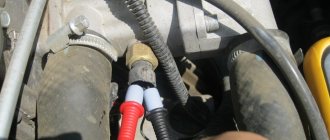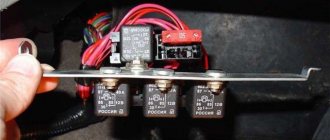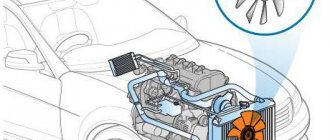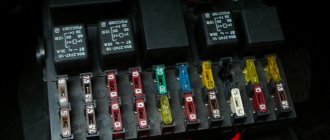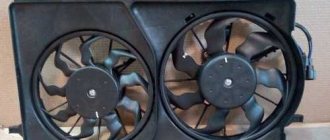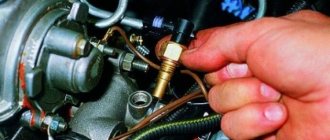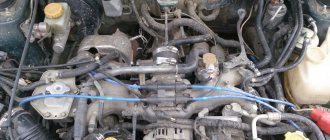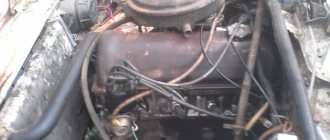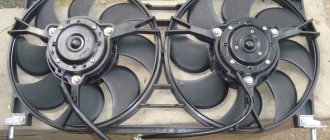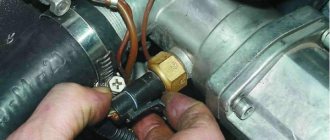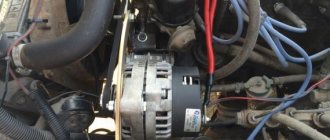4/5 — (76 votes)
Today we’ll talk about the reasons why the VAZ 2107 fan (injector and carburetor) does not turn on. A little earlier, we figured out how to improve the engine cooling system. The whole procedure is simple and does not require much knowledge. But an equally pressing problem is that the fan refuses to turn on in a timely manner. Let's try to find out why this happens.
Main types of faults
The fan is necessary to cool the radiator at times when there is no oncoming air flow, that is, during slow movement or parking. With its help, a warm air flow from the radiator flows to the engine, which is important during winter warm-up.
There are several options for incorrect operation of the VAZ-2107 electric fan:
- The device does not start under any conditions. In this case, the engine overheats. With this malfunction, it is important to look at the arrow indicating the temperature. If it reaches the red zone and the fan motor does not turn on, then the fault must be found in the power circuit or in the device itself. Most often the fan does not turn on due to:
- wear of brushes, commutator or armature winding of the electric motor;
- electrical circuit break;
- sensor malfunction;
- fuse blown;
- relay failure.
- Full time job. With this failure, the fan does not stop and spins up at any temperature. The following may cause a malfunction:
- sensor failure;
- stuck relay;
- short circuit of the power supply.
- Untimely switching on. This problem occurs when the temperature sensor readings are faulty. It transmits incorrect information to the relay, so it does not activate the device in time.
- Extraneous noise during operation. In the interior of the VAZ-2107, the moment the fan turns on is clearly audible. If this noise is accompanied by a creaking, hum or whistle, then you need to check the bearing or support sleeve of the cover. The appearance of a crackling or knocking sound is characteristic of contact of the impeller with the inner edge of the electric motor frame; this happens when the blades are deformed or misaligned.
If the fan is said to be not working, then most likely it does not start or does not work in a timely manner. Let's look at how to check the devices responsible for running it.
Control circuit modernization
The cooling fan on the top ten turns on at a temperature of 100-105°C, while the normal operating temperature of the engine is 85-90°C, so the fan turns on when the engine overheats, which naturally has a negative effect.
This problem can be solved in two ways: adjust the switch-on temperature in the “brains” or make a button. We'll focus on the second one. Turning on the fan from the button is very convenient: if you get into a traffic jam, turn it on, drive out, turn it off, and no overheating occurs.
A button for selecting the fan operating mode was installed in the cabin (always off, constantly on, automatically turned on via a sensor) - this “tuning” is not mandatory, but will be a very useful addition.
There will be a large current at relay contacts 87, 30, on the wire from the battery to the fuse and the fan ground, and therefore we must use wires there with a cross-section of at least 2 mm, otherwise the thinner wire will not withstand it and will burn out.
How to check a fuse
In the mounting block of the engine compartment there is a fuse responsible for the operation of the fan. Its designation on the power supply diagram is F-7, nominal value is 16A. Checking and replacing the fuse is carried out according to the instructions:
- Remove the negative terminal from the battery. Remove the mounting block cover.
- Pull the F-7 fuse out of its seat. Using a multitester, check it by connecting the probes to the contacts.
- If the device is blown, buy a new fuse and replace it with a new one.
This is the simplest repair option, which is carried out when the cooling fan does not work.
Checking and replacing the electric motor
A more complex option is to check and replace the electric motor. It is performed according to the instructions:
- Disconnect the fan power plug. Connect two wires to the fan connector, of such length that they can be brought to the battery terminals. After connecting to the plug, connect the wires to the battery and watch the fan react. No response means it needs to be replaced.
- If it works, then you need to check whether voltage is supplied. To do this, you need to place the voltmeter probes on the contacts of the second half of the plug. After this, start the engine. If you have a carburetor engine, then you need to additionally close the contacts of the temperature sensor using a screwdriver. Look at the voltmeter readings, the voltage should be from 11.7 to 14.5 V. If you have an injector, then you need to wait until the temperature reaches +85...+95 °C. After this, the on-board computer will send a signal to the relay to turn on the fan. As soon as this happens, look at the readings on the device, they should be within the same limits. Insufficient voltage or its absence indicates problems in the power circuit.
- After checking, when you realize that the fan does not start due to the motor, it is necessary to replace it. To do this, use socket wrenches to remove the two fasteners of the fan casing to the generator.
- Pull the casing towards you and release the wires from the retainer. To do this, use pliers to squeeze the fastening petals and then push them out.
- Remove the fan. While holding the impeller, unscrew the central nut securing it with a 13mm wrench.
- Remove the impeller from the shaft. Unscrew the electric motor mountings with a 10mm wrench.
- Remove the electric motor and replace it with a new one. After this, you need to reassemble the structure.
Temperature sensors rarely fail, so we will not dwell in detail on checking and replacing them. Most often the problem lies in the electric motor or power circuit.
Today we’ll talk about the reasons why the VAZ 2107 fan (injector and carburetor) does not turn on. A little earlier, we figured out how to improve the engine cooling system. The whole procedure is simple and does not require much knowledge. But an equally pressing problem is that the fan refuses to turn on in a timely manner. Let's try to find out why this happens.
Carburetor sevens
In these cars, the control system for turning on the electric fan is very simple. It can even be called analog. The entire circuit consists of the simplest form of the following elements:
- Electric fan motor.
- Power sensor.
- Wiring.
That's it, there is nothing else, you need to look for breakdowns only in these parts of the structure. In 70% of cases the sensor fails, in 5% the electric fan fails, in 20% the electrical wiring is to blame.
But some cars use a slightly more advanced circuit, which includes an electromagnetic relay. With its help, it is possible to remove high currents from the sensor. This increases the resource of the device.
Some drivers who are not used to trusting automation install a regular button parallel to the sensor (and sometimes instead of it). Such a scheme has a right to exist, but the driver himself must be extremely careful in order to notice the temperature rise in time and turn on the electric fan.
Troubleshooting algorithm
If the electric cooling fan does not work on your VAZ 2107 (carburetor), you need to do the following:
- Turn off the engine and turn on the ignition.
- Use a flat-head screwdriver to short-circuit the terminals of the fan switch sensor. Please note that all control is based on mass. If the fan turns on, the sensor is faulty. If it doesn’t work, then the reason lies deeper.
- Disconnect the block from the electric fan and supply power from the battery directly. A rotating rotor indicates that the engine is running. If the electric fan does not work even this way, you will have to think about replacing it.
- If the fan and sensor are working properly, you need to check the electromagnetic relay (if present in the circuit).
- The wires are checked last. Oxidation very often occurs at the joints with the car body. And sometimes a banal break even happens.
The same algorithm can partly be applied to cars on which an injector is installed.
But in order to compare and appreciate the difference, it is worth considering such machines.
Injection engines
Here everything is somewhat more complicated, since the following devices are responsible for the operation of the radiator electric motor:
- Electronic control unit.
- Coolant temperature sensor.
- Electromagnetic relay.
The reason why the electric fan may not work (or often turn on too much) lies in one of these components. Of course, the engine starts too often if the radiator honeycombs, either inside or outside, are very dirty, or if there are air pockets. But it does not turn on due to a breakdown in the control system.
So, you need to find a temperature sensor for diagnostics. It is located in one of the pipes of the VAZ 2107 engine cooling system. If you look at the engine from above, you will find it under the pipe that connects the fuel rail to the throttle valve. To check it, you need to disconnect the terminal and measure the resistance between the central terminal and ground. At a temperature of 20 degrees, the resistance should be about 3.5 kOhm. If the temperature is close to 90 degrees, then the resistance will be about 0.25 kOhm.
If there is no resistance, or it differs significantly from the values given above, then there is clearly a malfunction of the sensor and it cannot be repaired. The price of a new one will be approximately 100-200 rubles (depending on the seller’s appetite). But if the sensor is working, but the electric fan does not work, then you need to check its electric motor and switching relay. If no problems are found, diagnose the electrical wiring.
If this does not work, you will need the help of a competent auto electrician. Most likely, the firmware has gone wrong or part of the electronic control unit circuit has burned out. If there are no other troubles, then instead of an expensive replacement of the ECU it will be easier to install an electric fan switch sensor, since there is space in the radiators for its installation.
Perhaps this is where the troubleshooting can be completed. This algorithm will be enough to repair the cooling system. In the same case, if it is not possible to replace the relay or sensor, for example, simply connect the electric fan to the battery. Only after stopping be sure to turn it off.
The cooling system is designed in such a way that the fan starts only after the engine has warmed up to the set temperature. A malfunctioning fan switch can lead to serious engine problems.
Do not confuse this sensor with the coolant temperature sensor (DTOZH), which displays the engine temperature on the instrument panel and is installed on the right side of the engine.
It is possible to notice its breakdown in time only perhaps only in the summer, and even then in the city or when driving slowly, since the oncoming air flow is quite enough for the normal operation of the cooling system. The cooling system fan on VAZ 2107 cars starts with a characteristic noise, so the moment it starts is clearly audible.
Improving the cooling system with an electric fan
To improve cooling, you can replace the standard VAZ 2107 cooling fan with a more powerful and advanced one. Fans from Viburnum or Priora are suitable for this purpose. The eight-blade fan is especially effective, providing particularly strong air flow.
It is worth considering that the cooling system of the VAZ 2107 was initially designed for efficient operation. If it fails, the reason lies not in an ineffective standard battery, but in clogged radiator cells or a lack of coolant in the system. Therefore, if the engine overheats while the fan is running, it is worth checking the coolant level and cleaning the radiator honeycombs (or replacing it).
Does not work
Therefore, the search for reasons for the fan not turning on begins by removing the connector from the sensor with the ignition on. If the fan itself is working properly, then it should work. By inserting a load in the form of a light bulb into the connector terminals, the fan should stop. Thus, you check the electrical circuit of the fan motor. In this case, it will be fine, but the fan sensor will have to be replaced. However, it should be noted that there are also substandard sensors on sale, which, when installed on the engine, will also not work.
If, after removing the connector from the sensor, the fan does not work, then its functionality must be checked by connecting it directly to the battery. There are only two options for the experiment. If the fan is working, then you will have to check the functionality of the fuse that protects this circuit, the fan relay and the ECU. And if the fan does not work, then you will have to check the condition of its brushes for wear.
On carburetor engines of the VAZ-2107 car, there will be no ECU in the electrical circuit for turning on the fan, and some “sevens” do not even have a fan turn-on relay. Therefore, it is much easier to find the reason why the fan does not turn on, and many drivers of VAZ-2107 cars can cope with this.
Instructions: replacing the radiator grille.
Which thermostat is better to install https://vz07-up.ru/ssh/termostat.html#t2.
Scheme
We present to you a diagram for switching on the electric radiator cooling fan for the VAZ-2107, VAZ-2105 and VAZ-2104. In this circuit, there is a relay in the fuse block; therefore, a low-current sensor can be installed.
Where is the switching temperature located?
The fan switching sensor is located on injection models, on the aluminum outlet pipe of the cylinder head (article - 23.3828, used in VAZ-2107i-2112, 21213, 2123, ALFA ROMEO, DAEWOO, FIAT, LANCIA, OPEL), on carburetor models (TM 108 -02 92/87 C) it is installed on the engine cooling radiator.
For the “classic” fan, the operating temperature is 92 degrees and the shutdown temperature is 87 C 0, so installing a fan that is suitable in size, but with a different number, is not recommended.
On carburetor models the sensor is located on the radiator
Designs and principles of operation of sensors
Over the years, various models of fan switching sensors were installed on VAZ 2107 cars. At first these were electromechanical sensors, then they were replaced by electronics. Let's take a closer look at each device.
Electromechanical sensor VAZ 2107
Inside the electromechanical sensor there is a small container with ceresite mixed with copper powder. Above this substance there is a flexible membrane with a pusher attached to it. And the pusher, in turn, is connected to the moving contact. This entire structure is housed in a steel case with thick walls (which are necessary to ensure more uniform heating of the sensor). On the outside of the housing there are threads and a pair of electrical contacts.
The operation of the VAZ 2107 electromechanical sensor is based on the expansion of ceresite under the influence of high temperature
The sensor operates on a simple principle: the volume of ceresite changes with increasing temperature. Ceresite, heating up under the influence of almost boiling antifreeze, expands and raises the membrane, which sets the pusher in motion. It reaches the moving contact and closes it, which causes the fan to turn on. When the temperature of the antifreeze drops due to additional airflow, the ceresite cools down, the membrane goes down, the contact opens and the fan turns off.
Checking the electric fan and its circuits
In order to check the operation of the fan and power circuits on the injection “seven”, you need to disconnect the connector from the sensor, the ECU will give a command to turn on the fan. If this does not happen, then you need to check not the sensor itself, but the serviceability of fuse F7, the electric motor, the fan relay and the power circuits. Below is a diagram of how to turn on the VAZ 2107 injector cooling fan.
Circuit diagram for switching on the VAZ 2107 cooling fan (injector)
The principle of operation of such a device differs from TM 108 and is based on a change in resistance.
As the sensor heats up, it reduces the resistance; the ECU monitors this change and, when the specified parameter is reached (about 195 Ohms), turns on the fan relay.
On the carburetor model, everything is made somewhat simpler; if the fuse and relay are working properly, then in order for the electric motor to start, it is enough to remove the chips from the sensor and close them together.
The operating principle of the fan switch sensor installed on the radiator is this: in a cold state, the bimetallic plate opens the contacts, and when the temperature reaches 92 degrees (ideally), it closes and the relay is activated. In practice, quite often you can buy sensors with some spread in values. You can check the new one by heating it in water, controlling the temperature and switching on.
Signs of engine overheating and precautions
If you, while driving a car, find that the arrow on the instrument indicating the coolant temperature has moved into the red sector and continues to deviate in the direction of increasing it, it would be better to stop on the side of the road and immediately turn off the engine. If this is not done, the antifreeze or antifreeze will simply boil and try to escape, breaking the tightness of the system. Continuing to drive in such a situation is quite dangerous. Having stopped, it is necessary to check the functionality of all elements of the cooling system and determine the cause of overheating. Then, if possible, it should be eliminated. And if this is not possible, tow the car to the nearest service station.
Diagnostics
You can check the fan switch sensor by measuring the resistance under different temperature conditions. To do this, use a tester (multimeter) in ohmmeter mode and measure the resistance of the spare part. It should decrease in proportion to the heating of the coolant, as already mentioned, the higher the heating, the lower the resistance.
The resistance can be checked without removing it from the car; to do this, just remove the chip and take measurements on the contacts of the part and warm up the engine by monitoring its heating using the instrument on the panel. See the table with approximate values for the dependence of resistance on temperature below.
Before installing a new controller, you can check the change in resistance in a container of heated water.
You can check the electric motor by applying voltage from the battery, the blue wire is “+”, blue and black or just black is “-“.
It happens that the fan starts at unusually high temperature values, this indicates its malfunction.
If during the check it turns out that the electric motor, fuse, sensor are all working properly, in this case you need to check the serviceability of the relay. It happens that the contacts simply burn out. In the photo below
The fan relay on the VAZ 2107 injector is located on an additional unit under the “glove compartment” (see photo) it is on the leftmost number 23-3787.
Fan relay VAZ 2107 (injector)
If you have nothing to replace this relay with, you can repair it. The contact is attached to the plate and to restore its functionality it is enough to tighten the contact. For this:
- disassemble the relay;
- bend the top stop of the plate;
- lift the plate with the contact for easy access;
- press the contact;
- putting it back together.
It should be noted that over time the breakdown is repeated, verified.
Fuse box in the passenger compartment
Despite the lack of differences between the mounting blocks of the “sevens” with carburetor and injection engines, the latter are equipped with an additional block, which is installed in the cabin under the glove compartment. The block consists of blocks with relays and fuses:
Fuses are designed to protect:
How to remove the power supply
To replace the switching devices and fuses of the power unit control system, it is necessary to remove the bracket on which they are mounted. To do this, perform the following steps:
Since the additional block does not have any printed circuit board, there is nothing to restore in it, except for replacing the elements installed in it.
Having familiarized yourself with the purpose of the fuse box on the VAZ 2107 and step-by-step instructions for its dismantling and repair, finding and fixing the fault will not pose any particular problems even for novice car owners. It is important to monitor the condition of the fuses and promptly replace failed elements with parts of the same rating, which will eliminate the need for more serious repairs.
Source
Replacing the sensor
Replacing the sensor on an injection model is easier than on a carburetor model, since there is no need to drain the coolant. It is enough to place some rag to absorb the spilled coolant. Using a 19 key, the part is unscrewed, removed and a new one is quickly installed. When installing, it is rational to apply sealant to the threads in advance.
To carry out the replacement procedure on a carburetor car, you must first drain the antifreeze (antifreeze) and only then unscrew the sensor with a 30mm wrench and install a new one.
When purchasing temperature sensors and controllers, try to choose branded parts.
On some vehicles, an electric fan is provided to blow air over the radiator of the cooling system. It turns on when the sensor-switch 37101B, installed in the lower part of the right radiator tank, is activated. Previously, power was supplied to the fan motor through a relay. In this case, a TM-108 temperature sensor was used. Currently, the electric fan circuit has been simplified and the electric motor is powered directly through the sensor-switch contacts. The sensor is non-separable - in case of malfunction it must be replaced.
| rice. 1 |
Fig.1. Circuit diagram for connecting the electric motor of the engine cooling system fan
Technical data of the electric fan and sensor 37101B (TM-108).
Rated shaft speed
electric motor with impeller, min-1
Electric motor current consumption, A
Sensor contact closure temperature, °C
Sensor contact opening temperature, °C
Electric motor ME-272
(or similar) direct current with excitation from permanent magnets. Installed in a casing fixed to the radiator brackets. During operation, the electric motor does not require maintenance; a faulty one must be replaced.
To check the fan motor, we apply 12V voltage from the battery to the motor terminals - a working motor will start working.
To check the electric fan sensor-switch, disconnect the wires from the sensor and connect them to each other with the ignition on. If the fan starts working, the sensor is faulty.
By connecting an ohmmeter to the sensor terminals and lowering it into the water the length of the thread, we use a thermometer to measure the temperature at which the sensor turns on and off. To do this, heat the water almost to a boil, and then control the cooling. For a working sensor, the temperature characteristic should not differ from that given above.
This article will talk in detail about the VAZ 2107 forced-air fan. Two types of this design can be distinguished - electrical and mechanical. Any owner of a 7 begins to regret that in the summer, in a traffic jam, his fan switch suddenly fails. After such an incident, as a rule, they begin to think about improving the design. And modernization can be done in several ways.
Cooling fan VAZ 2107
In the power plants of the first "sevens" the radiator fan was installed directly on the water pump shaft. Like the pump, it was driven by a belt drive from the crankshaft pulley. This design was also used on other cars at that time. It almost never failed, and it was impossible to overheat the engine with it. However, she had one drawback. The constantly cooled power unit warmed up very slowly. That is why AvtoVAZ designers changed the principle of forced airflow, replacing the mechanical fan with an electric one, and with automatic activation.
Early modifications of the VAZ 2107 had a mechanically driven fan
Why do you need an electric fan?
The fan is designed for forced airflow of the cooling radiator. During operation of the power plant, liquid coolant enters the radiator through the opened thermostat. Passing through its tubes equipped with thin plates (lamellas), the refrigerant cools due to the heat exchange process.
Later modifications of the Sevens were equipped with electric cooling fans
When a car moves at speed, heat transfer is facilitated by the oncoming air flow, but if the car sits for a long time or drives slowly, the coolant does not have time to cool. At such moments, it is the electric fan that saves the engine from overheating.
Device design
The radiator fan consists of three main elements:
- DC motor;
- impellers;
- framework.
The fan consists of an electric motor, impeller and frame
The electric motor rotor is equipped with a plastic impeller. It is she who, rotating, creates a directed air flow. The engine of the device is installed in a metal frame, with which it is attached to the radiator housing.
How does an electric fan turn on and work?
The process of turning on the fan for carburetor and injection “sevens” is different. For the former, its activation is controlled by a mechanical temperature sensor mounted in the lower part of the right cooling radiator tank. When the engine is cold, the sensor contacts are open. When the temperature of the refrigerant rises to a certain level, its contacts close and voltage begins to be supplied to the brushes of the electric motor. The fan will continue to operate until the coolant cools down and the sensor contacts open.
The device circuit is closed via a sensor that responds to changes in refrigerant temperature
In injection “sevens” the electric fan switching circuit is different. Everything here is controlled by an electronic control unit. The initial signal for the ECU is information coming from a sensor installed in the pipe leaving the engine (near the thermostat). Having received such a signal, the electronic unit processes it and sends a command to the relay responsible for turning on the fan motor. It completes the circuit and supplies electricity to the electric motor. The device will continue to operate until the refrigerant temperature drops.
In injection "sevens" the fan is turned on by command from the ECU
In both carburetor and injection "sevens", the electric fan circuit is protected using a separate fuse.
Method one - forced mechanical cooling
Perhaps you can call it that. Remember the first VAZ 2101-2107 cars, which did not use electric fans. In them, the radiator was blown through an impeller screwed to the pump rotor. The exact same fan can be installed on a VAZ 2107 injector. The design of the cooling system is not much different.
But we must immediately mention some of the features of this design. The fact is that even in winter the radiator will be blown by air flow. This reduces the engine temperature, so the cabin can be quite cool. It’s good in the summer - the engine is always cooled, the fan is constantly running, the antifreeze does not boil.
But make two more small improvements and summer operation will be just a fairy tale:
- Place a plastic diffuser that will direct the air beam into the radiator honeycombs.
- The upper part of the radiator needs to be installed a little closer to the impeller blades. Fasteners should be made using small strips of hard metal. Try to ensure that the distance from the surface of the radiator to the impeller is in the range of 2-4 cm.
These are the little tricks that will help you improve the cooling of the VAZ 2107 engine. The price of the issue is literally meager - no more than 80 rubles (that’s how much the impeller costs).
Method two - electric
If you have a new car, an injector and an electric fan are installed, is it worth spoiling it with a forced impeller? It would be somewhat more reasonable to leave the electric fan, but make a backup way to turn it on using a button. Purchase several items and materials from the store:
- New sensor (if the old one has become unusable).
- Electromagnetic relay with normally open contacts.
- Red wire with a cross section of 0.75 square meters. mm.
- A button for installation in the dashboard of a VAZ 2107 (preferably backlit).
- Heat shrink insulation.
- Female connectors and relay socket.
The connection diagram is shown in the photo. First of all, turn off the fan and change the sensor for turning it on. Then you assemble the circuit.
Please note that newer vehicles use sensors that can handle very high currents. But despite this, they still burn out. Sudden loads still quickly damage it. What to do? There is only one way out - to reduce the current at the sensor terminals. To do this, introduce an electromagnetic relay into the circuit. Now the chance of sensor failure is reduced. But the chance of relay failure becomes higher. True, it will be easier to change it.
Install a button to force the fan on in the dashboard and stretch two wires from it - one can be connected directly to ground, and the second to the sensor output. It turns out that your button and sensor contacts are connected in parallel. Therefore, if the sensor fails, you can turn on the electromagnetic relay with a button.
Mounting block malfunctions and repairs
If a malfunction is detected in the electrical system of a car, first of all you need to pay attention to the mounting block - most often the breakdown is associated with the failure of its individual components. There are four main possible malfunctions of the mounting block:
IMPORTANT. The most common cause of a malfunction is a blown fuse. Before changing a fuse, you should find out the reasons for its blown; this is often due to a breakdown of the protected component or a short circuit in the circuit protected by this fuse.
A relay malfunction is diagnosed quite simply: first you need to try to change the fuse. If this does not help, a jumper wire should be inserted between the relay contacts; if after this a current appears in the circuit (that is, the malfunction is eliminated), then the relay must be replaced. In another case, the cause of the breakdown must be sought in the circuit itself. In modern mounting blocks, relays are installed using solderless connectors, so repairs can be carried out fairly quickly.
Diagnostics and repair of the mounting block, as well as the entire electrical system of the car, is a complex process. The best solution would be to contact a car service center or an auto electrician.
Source
Method three - perfect fans
To improve the cooling of the VAZ 2107, you can use more modern ones instead of a standard electric fan. Those that are installed on cars of the Kalina and Priora models are perfect. An electric fan with eight blades will work especially well. The air flow from it will be much stronger, therefore, the radiator honeycombs will cool down faster.
Today we’ll talk about the reasons why the VAZ 2107 fan (injector and carburetor) does not turn on. A little earlier, we figured out how to improve the engine cooling system. The whole procedure is simple and does not require much knowledge. But an equally pressing problem is that the fan refuses to turn on in a timely manner. Let's try to find out why this happens.
Carburetor sevens
In these cars, the control system for turning on the electric fan is very simple. It can even be called analog. The entire circuit consists of the simplest form of the following elements:
- Electric fan motor.
- Power sensor.
- Wiring.
That's it, there is nothing else, you need to look for breakdowns only in these parts of the structure. In 70% of cases the sensor fails, in 5% the electric fan fails, in 20% the electrical wiring is to blame.
Advice!
To diagnose a car, I recommend using a fairly cheap solution: install it once and use it always.
But some cars use a slightly more advanced circuit, which includes an electromagnetic relay. With its help, it is possible to remove high currents from the sensor. This increases the resource of the device.
Some drivers who are not used to trusting automation install a regular button parallel to the sensor (and sometimes instead of it). Such a scheme has a right to exist, but the driver himself must be extremely careful in order to notice the temperature rise in time and turn on the electric fan.
Troubleshooting algorithm
If the electric cooling fan does not work on your VAZ 2107 (carburetor), you need to do the following:
- Turn off the engine and turn on the ignition.
- Use a flat-head screwdriver to short-circuit the terminals of the fan switch sensor. Please note that all control is based on mass. If the fan turns on, the sensor is faulty. If it doesn’t work, then the reason lies deeper.
- Disconnect the block from the electric fan and supply power from the battery directly. A rotating rotor indicates that the engine is running. If the electric fan does not work even this way, you will have to think about replacing it.
- If the fan and sensor are working properly, you need to check the electromagnetic relay (if present in the circuit).
- The wires are checked last. Oxidation very often occurs at the joints with the car body. And sometimes a banal break even happens.
The same algorithm can partly be applied to cars on which an injector is installed.
But in order to compare and appreciate the difference, it is worth considering such machines.
Where is the fan relay located?
4 – electric fan relay; 5 – electric fuel pump relay; 6 – main relay (ignition relay).
Attention: the order of the relays and fuses can be arbitrary, we are guided by the color of the wires. Therefore, we find a relay from which comes a thin pink with a black stripe wire coming from the main relay (pin 85*) (not to be confused with the thin, red with a black stripe wire coming from the controller) and a thick power white with a black stripe wire (pin 87) (white and pink wires we need), this is the fan relay.
Injection engines
Here everything is somewhat more complicated, since the following devices are responsible for the operation of the radiator electric motor:
- Electronic control unit.
- Coolant temperature sensor.
- Electromagnetic relay.
The reason why the electric fan may not work (or often turn on too much) lies in one of these components. Of course, the engine starts too often if the radiator honeycombs, either inside or outside, are very dirty, or if there are air pockets. But it does not turn on due to a breakdown in the control system.
So, you need to find a temperature sensor for diagnostics. It is located in one of the pipes of the VAZ 2107 engine cooling system. If you look at the engine from above, you will find it under the pipe that connects the fuel rail to the throttle valve. To check it, you need to disconnect the terminal and measure the resistance between the central terminal and ground. At a temperature of 20 degrees, the resistance should be about 3.5 kOhm. If the temperature is close to 90 degrees, then the resistance will be about 0.25 kOhm.
If there is no resistance, or it differs significantly from the values given above, then there is clearly a malfunction of the sensor and it cannot be repaired. The price of a new one will be approximately 100-200 rubles (depending on the seller’s appetite). But if the sensor is working, but the electric fan does not work, then you need to check its electric motor and switching relay. If no problems are found, diagnose the electrical wiring.
Replacing fog lamp fuses
The VAZ 2107 has another fuse, which is responsible for the operation of the fog lights. Many “Seven” car owners often cannot find this device. It is located directly under the console central panel. There is a button for turning on the fog lights, next to which the fuse is located. To replace it, you will need to remove the panel. This unit is located in a round oblong contact box. To replace it, you need to remove it and replace it with a new one.
In order to check or replace fusible safety lights, it is necessary to perform the following sequence of operations:
